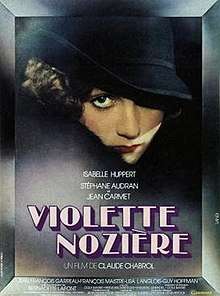Violette Nozière
Violette Nozière is a 1978 French crime film directed by Claude Chabrol and starring Isabelle Huppert and Stéphane Audran. The film, based on a true French murder case in 1933,[1] is about an eighteen-year-old girl named Violette and her encounters with a number of older men. The film had a total of 1,074,507 admissions in France.[2]
| Violette | |
|---|---|
 French Theatrical Release Poster | |
| Directed by | Claude Chabrol |
| Produced by | Eugène Lepicier Denis Héroux |
| Written by | Odile Barski Hervé Bromberger Frédéric Grendel |
| Starring | Isabelle Huppert Stéphane Audran Jean Carmet Jean-François Garreaud Guy Hoffman Lisa Langlois |
| Music by | Pierre Jansen |
| Cinematography | Jean Rabier |
| Edited by | Yves Langlois |
| Distributed by | Koch-Lorber Films |
Release date |
|
Running time | 124 minutes |
| Country | France Canada |
| Language | French |
| Budget | CAD 1,360,000 |
Plot
Violette Nozière (Isabelle Huppert) is a French teen in the 1930s who secretly works as a prostitute while living with her unsuspecting parents, father Baptiste Nozière (Jean Carmet) and mother Germaine Nozière (Stéphane Audran). Rebelling against her "mean and petty" petit-bourgeois parents, she falls in love with a spendthrift young man, whom she virtually supports with thefts from her parents as well as her prostitution earnings.
Meanwhile, her parents are informed by Violette's doctor that she has syphilis. Violette manages to half-persuade her suspicious mother and indulgent father that she has somehow inherited the disease from them. On this pretext, she tricks them into taking "medicine" that is actually poison, killing her father; her mother, however, survives, and Violette is arrested and charged with murder. She defends herself by alleging that her father had molested her; Chabrol's abrupt use of flashbacks makes it uncertain whether Violette is simply lying or telling a half-truth. She is convicted of murder and sentenced to die by guillotine, but a voiceover at the end tells us that her sentence was commuted by degrees to the point that she ultimately left prison, married, and had five children.
Cast
- Isabelle Huppert as Violette Nozière
- Jean Carmet as Baptiste Nozière
- Stéphane Audran as Germaine Nozière
- Jean-François Garreaud as Jean Dabin
- Zoe Chauveau as Zoe the Maid
- Jean-Pierre Coffe as Dr. Deron
- Jean Dalmain as Mr. Emile
- Guy Hoffman as the Judge
- Henri-Jacques Huet as Commissioner Guilleaume
- Bernadette Lafont as Violette's Cellmate
- Bernard Lajarrige as Andre De Pinguet
- Bernard Alane as Pinguet's Son
- Lisa Langlois as Maddy
- Fabrice Luchini as Camus
- Dominique Zardi as Boy in Cafe
Awards and nominations
The film was entered into the main competition at the 1978 Cannes Film Festival, where Isabelle Huppert won the award for Best Actress.[3] At the César Awards, Stéphane Audran was awarded Best Supporting Actress. The film was also nominated in three other categories: Best Actress (Isabelle Huppert), Best Music (Pierre Jansen) and Best Production Design (Jacques Brizzio).
See also
- Isabelle Huppert on screen and stage
References
- "Life for Violette". Time. January 7, 1935. Retrieved 2010-09-28.
- JP (1978-05-24). "Violette Nozière (1978)". JPBox-Office. Retrieved 2011-08-22.
- "Festival de Cannes: Violette Nozière". festival-cannes.com. Retrieved 2009-05-21.